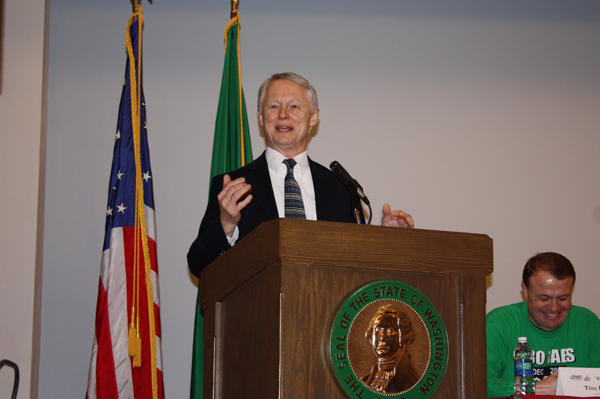Centennial celebration: WA initiative process turns 100 in 2012
Secretary Reed draws a smile out of Tim Eyman
Secretary of State Sam Reed and the Foley Institute at Washington State University teamed up Friday for a centennial celebration of Washington’s initiative process being approved by the voters.
Panelists described the historic sweep of a hundred years of “direct democracy” being used to pass some of the state’s landmark pieces of legislation — and talked about the growing expense of qualifying for the ballot, the rising role of well-heeled interests, whether it’s working as intended and whether reforms are needed.
Panelists were Katie Blinn, state elections co-director; Todd Donovan, political scientist at Western Washington University and a national expert on the I&R process; Tim Eyman, the citizen activist who is the greatest user and defender of the system; and former House Majority Leader Lynn Kessler, D-Hoquiam, who has noted that voters sometimes pass expensive initiatives that lawmakers can’t afford to fund within existing revenue. Moderator was Austin Jenkins of public radio and TVW, and the forum was opened by remarks from Cornell Clayton, director of the Thomas S. Foley Institute for Public Policy and Public Service.
The session was taped by TVW for viewing on cable and online. TVW is televising the event Feb. 21 at 7 p.m. (if House Ways & Means isn’t meeting then) and 10 p.m., Feb. 23 at 8 p.m., and Feb. 26 at 10 a.m. and 7 p.m.
It was 100 years ago this fall that voters approved a constitutional amendment creating this right of initiative, referendum and recall – and it has been a rambunctious century of citizen legislating, noted Reed, the state’s chief elections officer for the past 12 years.
Reed sketched in a bit of history:
“It started with voters bringing in Prohibition back in 1914 (much to the chagrin of students everywhere!). Along the way it’s been used to give us colored margarine, daylight savings time, redistricting, the presidential primary, Tim Eyman’s initiatives, a state income tax back in 1932, the public disclosure and public records act of 1972, the death penalty, a big tax on tobacco, repeal of ergonomics rules, performance audits, abortion rights, gay rights, death with dignity, medical marijuana, class size and teacher pay, banning school busing for desegregation, three-strikes-and-you’re out, spending and tax limits, annual adjustments in the minimum wage, nuclear waste, the shorelines act, term limits and Paul Allen’s football stadium.”
The system was created as part of the progressive era where the Grange and Labor and others were distrustful of concentrated power and wanted to have a way for the little guy to pass legislation when Olympia was too controlled by the big-money special interests, he noted.
The process has been used by people and organizations from across the political spectrum, Reed said.
“It’s no longer mom & pop legislating by the little guy. Successful sponsors today typically have buckets of money for paid signature-gathering and a sophisticated campaign. Last year, you’ll recall that Costco alone spent a record $20 million on the liquor privatization measure and the other side spent roughly $12 million.”
“But the I&R process rolls along, and is usually a big, big part of every election cycle. This fall, for instance, we could see gay marriage and marijuana on the ballot….”
Blinn described the various types of initiatives and referenda, attempts to amend or crack down on the process, and how the Secretary of State’s office handles signature verification.
Donovan said the process is “at least as democratic as it ever was,” but that getting measures on the ballot is getting very expensive. More national issues and more big-monied interests seem to be involved, he said. He called the initiative “messy,” but said ballot measures tend to track public opinion, sometimes more closely than their elected representatives reflect.
Kessler, a veteran legislative leader who retired last year, wasn’t sharply critical of the process, but said the Legislature has to deal with stark realities of having a finite budget pie. She said some initiatives are like asking kids if they’d like a dozen cupcakes — well, of course. But as one example, she said, having voters approve $1 billion worth of unfunded education initiatives caused other programs, including higher education, to be cut, she said. The measures have been suspended during budget downturns and some lawmakers say they should be abolished.
Eyman said the initiative is an important voice for the people who sometimes are ignored by Olympia. He said in the past 13 years, about 6,500 laws were passed by the Legislature, dwarfing the 21 initiatives that voters approved at the ballot. He characterized 11 of the winning measures as being liberal/progressive and 10, including his own seven, as coming from conservatives.
He urged Olympia to “just leave it alone,” referring to regular attempts to circumscribe the process. He noted that the Constitution requires the state to “facilitate” the process and calls initiatives and referenda the first right reserved to the people.
